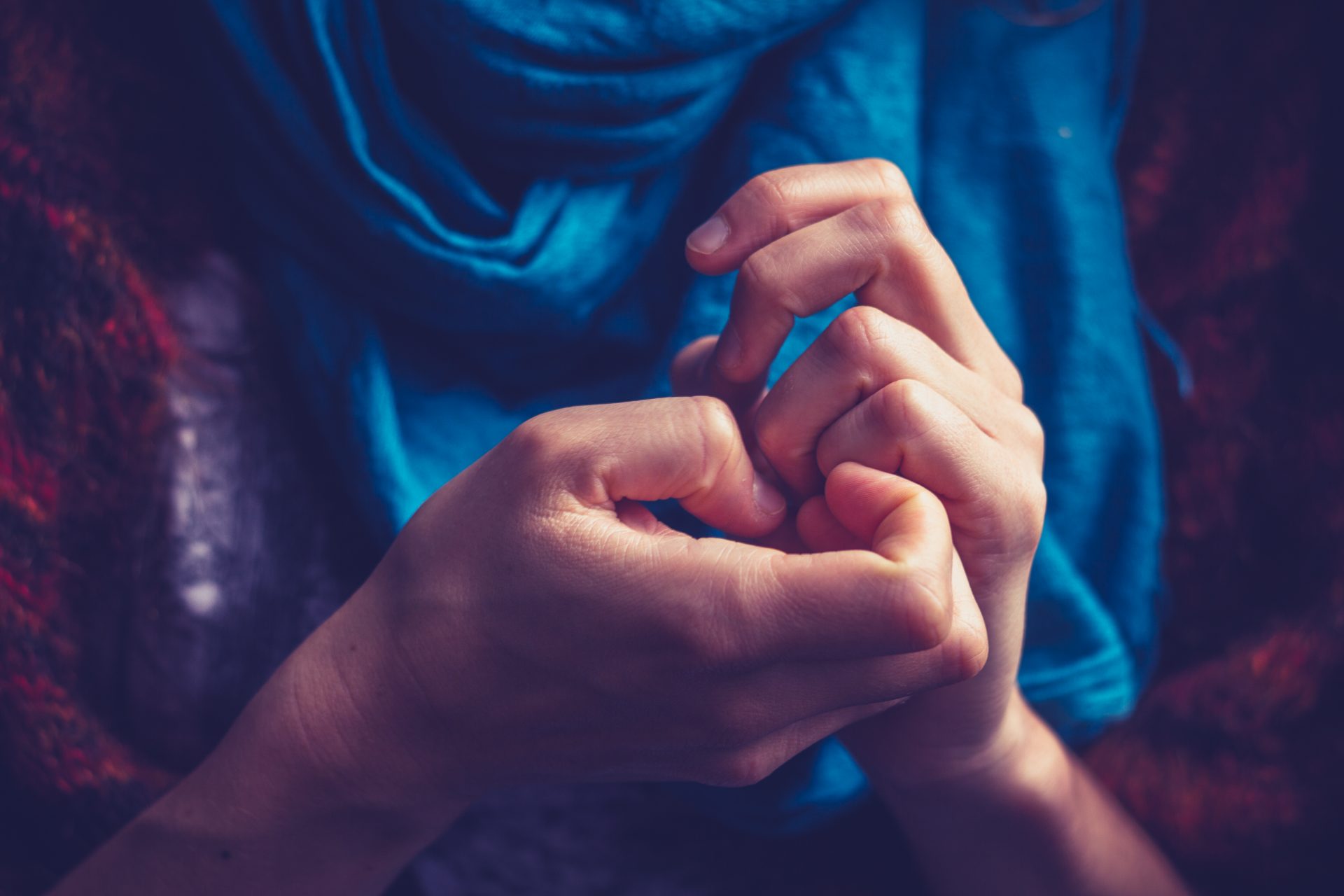Welcome to Beauty Feels, a series exploring the different ways in which beauty routines and rituals can provide emotional support and aid journeys of self-discovery.
For Raadia Imran, dermatillomania has wreaked havoc with her skin and confidence for 10 years but time in lockdown became a particularly intense and triggering period for her skin-picking urges. Here, she discusses the ways skin-picking has had a debilitating impact and how she’s overcoming it.
Most of us have popped a pimple, picked at a scab, or scratched a bump. The temptation can be hard to resist. But for me, this normal action grew into a problem that affected me daily and turned into something I felt I had no control over.
The compulsive urge to pick, scratch or dig at your skin is known as dermatillomania. It falls into a group of body-focused repetitive behaviours (BFRB), according to OCD UK, and causes unintended physical damage.
As a teenager, I was never able to ‘ride out’ a spot. My combination skin was well behaved for the most part, but whenever I saw a red bump take up space on my face, I lacked the patience to wait for it to vacate the premises. Instead, I would hack away at it, forcing its eviction. Although the gratification was instant, what followed was deep shame at the weeping wound and sickening dread at how I would cover it up.
You may also like
How to stop skin picking: what is dermatillomania and why do we get it?
I soon realised that this was becoming more than just a ‘bad habit’ when, even after my breakouts had subsided, I was still scanning my skin for something to pick. It was becoming a ritual to spend every night in a focused, mirror-picking session before bed. I would spend up to 30 minutes locked in the bathroom, my nose an inch away from the mirror, eliminating any minuscule imperfection. I’d pick and dig at tiny whiteheads and the little bumps on my forehead, all highlighted under the harsh and unforgiving glare of the bathroom light.
During this time, I often fell into a trance, disassociating myself while feeling a temporary release of tension, anxiety and boredom. Picking was – and still is – something done in private. And despite filling me with embarrassment, I have struggled to stop.
It can take anything from a difficult day to an extra minute spent looking in the mirror to trigger another picking episode and sabotage days worth of progress
The satisfaction of ‘fixing’ imperfections is only fleeting because, when I eventually pull away from the mirror, I am horrified at the raging-red sirens blaring on my face. After particularly intense ‘picking episodes’, my face is inflamed and bleeding.
Small bumps are now swollen lumps and tiny pimples have been dug into painful craters. The all-too familiar feeling of guilt washes over me and I am filled with self-loathing as I desperately question why I self-destruct in this way. This then affects me mentally for the following weeks while I undergo a “rescue mission” and attempt to repair the damage.
The day after I’ve skin-picked is a write-off. I try my best to stay at home while covered in Sudocrem and hydrocolloid plasters, willing my skin to heal. I feel low and dejected and hate myself for wanting to hide away from the world. Hiding, however, is rarely an option when you have two children, so I use make-up as a necessary crutch for my confidence. I apply copious amounts of concealer to camouflage the scabs and avoid eye-contact while I’m out and about. Feeling self-conscious is exhausting and I internally scream at myself for causing this unnecessary grief.
I always try to plan outings with family and friends a week in advance, this way I know I must refrain from picking while counting down to the date. But once I’ve successfully reached the day of the event and enjoyed myself, I come back home and pick. It’s almost like a reward for my disciplined efforts, but also because I’ve pent up the compulsion to do so for so long. It’s stressful. My self-control comes in waves and when I give in to picking, I feel defeated.
Sometimes, I have a spell of “good skin” and I will scoff at my skin-picking urges, feeling very smug that I am past it. But dermatillomania soon humbles me. It can take anything from a difficult day to an extra minute spent looking in the mirror to trigger another picking episode and sabotage days worth of progress. For a decade, I have battled with this cycle, struggling to cope with the compulsive picking urges that cripple my confidence. There are periods when I have been particularly stressed and overwhelmed, like becoming a new mother and, later, going through a divorce, that have caused my picking to intensify.
Picking holds the power to postpone and cancel my plans. It can control what I choose to do that day and I have, regretfully, avoided meeting family while my skin is still recovering
This past year in lockdown saw more skin-picking nights – the urge became overwhelming, especially after long, repetitive days indoors. Looking after my kids around the clock while juggling home-schooling, working, cooking, and cleaning as a single mother was leaving me depleted and stressed. I stored this frustration until the kids went to bed and then I would pick away at my face. While picking I am strangely relaxed but after a session, I am filled with that familiar regret which only emotionally drains me further.
The lack of social accountability during lockdown didn’t help either. I didn’t have to face the other mums at the school gate or the students in my English classes. But I did still have to face up to myself and my children. My mental health was suffering, and it was making me reluctant to go out and even meet with the family members in my support bubble. Picking holds the power to postpone and cancel my plans.
Desperate to free myself from the hold this compulsion, I started to seriously research dermatillomania and worked hard to closely identify my triggers. I know a GP or skin expert could help and also began keeping a skin diary, so I could note when I picked and how it made me feel. I know I am most vulnerable at night and most of the picking happens in my bedroom mirror. So, I keep the main light off as I am getting ready for bed and sometimes cover the mirror with a scarf as an extra deterrent.
I came across a supportive dermatillomania community on Instagram and non-profit organisation Picking Me Foundation, which offers alternatives to skin-picking rituals. The strength of other sufferers alleviated some of my shame, knowing I wasn’t the only one who coped with anxiety in this way. Part of my healing process has been reaching out and engaging with this online community and sharing my story with those who understand first-hand the impact that picking can have on your life.
One of the replacement strategies I saw being shared on social media was implementing a tailored skincare routine. This way I would still be touching my skin – but in a kind and healing way. After browsing countless skincare posts I was armed with the products that would help with my texture and post-picking marks.
You may also like
How to address stressed skin, according to a psychodermatologist
I now spend the time before bed – my danger-zone period – socially distancing from my mirror while applying a BHA toner, niacinamide serum and vitamin E oil, massaging it into my face using a jade roller. Not only has this done wonders in slowly fading post-picking hyperpigmentation, but it also stifles the urges to peer closer at my skin and tamper with the expensive skincare I’ve lathered onto my face. This nightly skincare routine helps to centre and calm me after a long day.
I’ve also found a lot of comfort in confiding to my sisters about my struggles with skin-picking. They’ve been so supportive and listen without judgement. Most nights I will send them accountability pictures of my skin on Snapchat, especially if I feel an urge to pick before bed. It helps me to resist, as I don’t want them to see a red mess. Another crucial part of my skin-healing journey has been self-acceptance and the dawning realisation that it is okay to have texture, clogged pores and blemishes – they don’t make me any less worthy.
I still struggle with this disorder – but I am starting to feel more in control.
Instead of resisting the urges to pick, I try to embrace the feeling. Yes, I do want to pick but what is my mind really trying to tell me? Am I stressed? Tired? Nervous? What can I do about this? Should I speak to my sisters? Do I need a break from the kids? Time alone? Time outside? I feel like my skin, which has consistently healed graciously for me, deserves my respect and acceptance.
It’s a journey but one I’m committed to following through. I pick me over picking my face.
If you, or someone you know, is struggling with dermatillomania, you can find support and resources on The British Skin Foundation or contact your GP. You can also find information on US-based The TLC Foundation for Body-Focused Repetitive Behaviors.
If you, or someone you know, is struggling with their mental health, you resources on the mental health charity Mind’s website and NHS Every Mind Matters or access the NHS’ list of mental health helplines and organisations here. For confidential support, you can also call the Samaritans in the UK on 116 123 or email [email protected].
You may also like
“I’ve suffered from trichotillomania for over a decade – here’s what helped me overcome it”
Main image: Getty
Source: Read Full Article



